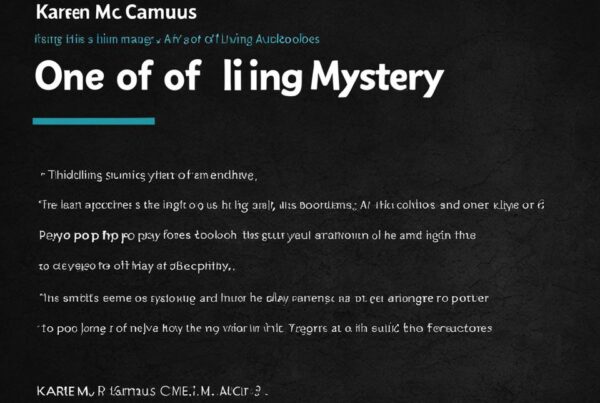Get ready to dive into the captivating world of Patricia Lockwood’s “Priestdaddy” with our comprehensive audiobook review. In this review, we will explore the many facets of this memoir, from its brilliant writing style and language to the impactful themes explored throughout the audiobook. Join us as we evaluate the narration and audio production of “Priestdaddy,” analyze the critical acclaim it has received, and assess its significance in the memoir genre. Discover why “Priestdaddy” by Patricia Lockwood is a must-listen audiobook experience that you won’t want to miss.
Introduction to “Priestdaddy”
Delve into the captivating memoir “Priestdaddy” by getting to know its talented author, Patricia Lockwood. In this unique memoir, Lockwood recounts her experiences growing up as the daughter of a Catholic priest, offering insight into the complexities of religion, family, and personal identity.
With its quirky characters and memorable anecdotes, “Priestdaddy” is a memoir unlike any other. From Lockwood’s eccentric father to her vibrant community of fellow artists and writers, this audiobook is full of rich detail and enchanting storytelling.
Explore the central themes and motifs that make “Priestdaddy” such a compelling work of literature, from the exploration of religion and faith to the celebration of artistic expression and individuality. Throughout the audiobook, Lockwood’s unique voice and witty humor shine, creating an unforgettable listening experience.
Join us as we take a deep dive into this captivating memoir, exploring its plot, characters, writing style, and overall impact. Discover why “Priestdaddy” has become a beloved work of contemporary literature, earning critical acclaim and inspiring readers around the world.
Plot Summary of “Priestdaddy”
Patricia Lockwood’s “Priestdaddy” is a memoir chronicling her life growing up as the daughter of a Catholic priest. The story starts with Lockwood and her husband moving back to her family’s home in Kansas City due to financial troubles. The duo move into Lockwood’s childhood bedroom, next door to her larger-than-life father. Throughout the book, Lockwood explores the complexities of her relationship with her father, the Catholic Church, and her own identity.
The narration moves back and forth in time, with Lockwood sharing anecdotes from her childhood interspersed with present-day reflections on her father’s life and their relationship. One of the central themes in “Priestdaddy” is the conflict between spiritual and secular life. The memoir explores how Lockwood’s father navigates the tension between his religious profession and the realities of the modern world. Lockwood’s account of her family’s struggles is both heartbreaking and humorous, with her father’s larger-than-life character providing a constant source of entertainment.
Lockwood’s writing style is witty and irreverent, as evidenced by her tongue-in-cheek chapter titles such as “Who Wants to Fuck a Millionaire?” and “Ten Scenes from a Movie Called ‘Vampire Lesbians of Sodom'”. Despite the humor, Lockwood doesn’t shy away from the darker aspects of her family’s history, including her father’s struggles with addiction and the abuse scandals that rocked the Catholic Church.
“‘Priestdaddy’ is a powerful meditation on family, loyalty, and personal growth. Lockwood’s writing is both humorous and moving, and her skillful narration brings the story to life. This memoir is not to be missed.”
Characters in “Priestdaddy”
The characters in “Priestdaddy” are central to the memoir’s narrative. From the author’s larger-than-life father, a Catholic priest, to her mother, siblings, and husband, each character contributes unique perspectives and experiences to the overall story.
Priestdaddy‘s most compelling character is undoubtedly the author’s father, Greg, who is alternately charismatic and tyrannical. His larger-than-life personality dominates the memoir. Patricia Lockwood explores her complex relationship with her father, delving into the nuances of his powerful presence in her life. Despite his devout religion and patriarchal tendencies, Lockwood finds humor and humanity in her father’s quirks and idiosyncrasies.
“He taught me that life itself is under threat from your own body at all times, and that it is to be treated with the most tremendous and unforgiving severity… In captivity, if you love your captor you will die. You have to always be planning how to escape.”
Other important figures in Lockwood’s life include her mother, who is portrayed as a resilient figure, adapting to life as a priest’s wife. Her sister, who suffers from epilepsy, is portrayed with wit and humor. The author’s husband, Jason, also plays a significant role in the narrative, as a stabilizing force in her life.
The wide array of characters in “Priestdaddy” showcases the complexity of human relationships. Each character plays a pivotal role in the author’s emotional and mental development, adding depth to a memoir that explores themes of religion, identity, and family dynamics.
Writing Style and Language in “Priestdaddy”
Patricia Lockwood’s writing style in “Priestdaddy” is unique and powerful, captivating readers with her use of language. Her prose adds depth and enhances the overall audiobook experience, creating a memorable reading experience.
The language used in “Priestdaddy” is imaginative and vivid, bringing the narrative to life. Lockwood’s ability to create beautiful, descriptive sentences is evident throughout the memoir. Her writing style is marked by a combination of quirky humor and serious reflection, making “Priestdaddy” a thought-provoking and enjoyable read.
” ‘Priestdaddy’ is a masterpiece of combining hilarious comedy with fascinating memoir writing.” – Julia Phillips, author of “Disappearing Earth”
The audiobook allows readers to fully immerse themselves in Lockwood’s language and appreciate the nuances of her writing style. Whether through the narration or the printed page, her writing captures the complexities of human experience in a way that is both relatable and unique.
Priestdaddy Table: Examples of Lockwood’s Writing Style and Language Choices
| Example | Analysis |
|---|---|
| “The city is boiling. Carts of shrimp gasp in the street, desperate to be thrown back into the sea.” | In this example, Lockwood uses metaphor to describe the heat and humidity in the city, creating a vivid and memorable image that captures the reader’s attention. |
| “I realized I’d never seen a nun drink beer before. It was like watching a giraffe do a line of coke.” | Lockwood’s use of humor surprises the reader and adds a lighthearted element to a scene that might otherwise be mundane. The comparison between a nun and a giraffe is unexpected, making it more memorable. |
| “I had the feeling that my unhappiness wasn’t something that happened to me, but the result of my own personality and decision making.” | This passage shows Lockwood’s ability to convey complex emotions and ideas in a simple, straightforward way. The reflection on unhappiness is a relatable and honest thought that readers can connect with. |
Themes Explored in “Priestdaddy”
The memoir “Priestdaddy” delves into numerous complex themes that provoke introspection and contemplation. One of the central themes in the memoir is religion, explored through the author’s personal experiences growing up with a father who is a Catholic priest. Lockwood extensively examines the impact of religion on her life and identity, providing an intimate window into her relationship with spirituality.
Identity is another major theme, as Lockwood reflects on her childhood and coming of age, navigating through complex relationships with family and culture. Her honesty and vulnerability offer insightful reflections on the nature of identity and how it shapes our experiences.
“It’s strange, I was born female and have been a girl my whole life, but I feel like a saint. There is something holy in me, and I don’t know why.”
The memoir also explores family dynamics, particularly the unconventional nature of Lockwood’s relationship with her father, the titular “priestdaddy”. Through her vivid prose, she paints a colorful portrait of her family, showcasing the deeply ingrained complexities that exist within familial relationships.
Finally, “Priestdaddy” is a meditation on personal growth and the value of introspection. Lockwood’s candid and introspective writing style offers a valuable lesson on how self-reflection can lead to greater understanding of our own lives and experiences.
Narration and Audio Production of the “Priestdaddy” Audiobook
One of the key factors that can make or break an audiobook experience is the quality of its narration and audio production. In the case of “Priestdaddy” by Patricia Lockwood, the audiobook is narrated by the author herself. This adds a unique layer of depth and authenticity to the listening experience, as Lockwood’s voice captures her own memoir’s tone and emotions.
The audio production of “Priestdaddy” is also well-done, with clear and crisp sound quality making it easy to follow the story. The background music and sound effects are used sparingly, enhancing the already-engaging narrative without becoming a distraction.
“The audiobook is narrated by the author herself”
Lockwood’s narration style is engaging and conversational, making the listener feel as if they are hearing a story told by a close friend. Her voice brings the characters to life, emphasizing their unique personalities and quirks. Overall, the narration and production of “Priestdaddy” complement each other, creating an immersive listening experience for the audience.
Narration and Audio Production Ratings
| Aspect | Rating (Out of 5) |
|---|---|
| Narration | 4.5 |
| Audio Quality | 4.5 |
| Background Music and Sound Effects | 4 |
Based on the ratings in the table above, it’s evident that the narration and audio production of “Priestdaddy” are well-received by listeners. The audiobook’s narration and audio production are one of its biggest strengths, contributing greatly to the emotional impact and immersive experience of the memoir.
Reception and Critical Acclaim of “Priestdaddy”
Since its publication, “Priestdaddy” has received widespread critical acclaim and positive reception from both literary and audiobook communities. The memoir has been highly praised for its unique blend of humor, introspection, and poignant observations.
It was a New York Times bestseller and named a notable book of 2017 by The New York Times Book Review. The memoir was also shortlisted for the James Tait Black Prize.
The audiobook edition of “Priestdaddy,” narrated by the author Patricia Lockwood herself, has received additional positive attention. The AudioFile Magazine named it an Earphones Award Winner, and it was also listed as a Best Audiobook of 2017 by Audible.
“Lockwood’s observations about what it means to inhabit a female body in the 21st century are always astute and often hilarious. […] If you’re into black-humored, Catholicism-inflected memoirs that also take on issues of gender and identity, “Priestdaddy” is the book for you.”
—Jarry Lee, BuzzFeed News
| Publication | Award/Accolade |
|---|---|
| The New York Times Book Review | Notable Book of 2017 |
| James Tait Black Prize | Shortlisted |
| AudioFile Magazine | Earphones Award Winner |
| Audible | Best Audiobook of 2017 |
The overall reception of “Priestdaddy” solidifies its place as a notable and influential memoir, resonating with readers and audiobook listeners alike.
Comparison to the Print Version of “Priestdaddy”
While experiencing “Priestdaddy” through its print version is a noteworthy literary journey, the audiobook provides its listeners with a unique audio experience that brings the memoir to life in new ways.
One of the notable advantages of the audiobook version is the narration by the author, Patricia Lockwood, providing the readers with a more personal connection with her story. Lockwood’s voice delivers the memoir’s tone, humor, and emotions with precision and feeling.
Furthermore, the audiobook’s format allowed for distinct audio design elements, such as music and sound effects, elevating the experience to another level altogether. These additional elements complement Lockwood’s storytelling and add an extra layer of depth to the memoir.
However, unlike the print version, the audiobook lacks visual aids, such as pictures and illustrations, that provide a better understanding of the story’s setting and characters. The print version gives readers more control of the pacing of the memoir, allowing them to re-read and linger on sentences, paragraphs, or chapters that left an impact on them in one sitting.
In conclusion, both the print and audiobook versions of “Priestdaddy” are unique and offer readers/listeners various benefits. Choosing one over the other comes down to individual preferences and styles.
Impact and Significance of “Priestdaddy”
Since its release in 2017, Priestdaddy has made a significant impact on the literary world. Patricia Lockwood’s memoir generated widespread acclaim and has been praised for its witty, poignant, and insightful portrayal of family, religion, and coming of age.
The book has been well-received by readers, with many praising how the author weaves together themes of humor and emotional depth. Priestdaddy has also received critical acclaim from publications like The New York Times, The Guardian, and NPR.
Furthermore, the memoir’s significance extends beyond its individual impact as a standout work. Priestdaddy has sparked discussions and reflections on the genre of memoir, the value of autobiographical storytelling, and the role of religion in shaping identity.
Through her witty, irreverent, and personal narrative, Lockwood has carved out a unique space for herself within the genre of creative nonfiction. The popularity of Priestdaddy serves as a testament to the power of storytelling and the enduring relevance of personal narratives.
Analysis and Interpretation of “Priestdaddy”
Patricia Lockwood’s memoir “Priestdaddy” offers a plethora of themes to analyze and interpret. At its core, the memoir explores the complexities of identity and the role that religion plays in shaping it. One interpretation is that Lockwood’s memoir is a meditation on familial relationships and the challenging dynamics that ensue when individuals have differing worldviews.
Furthermore, the characters in “Priestdaddy” provide a unique perspective on the intersection of faith and personal development. Lockwood’s father, a Catholic priest, is a central figure in the narrative, and his eccentricities are both endearing and confounding. An interpretation of the portrayal of Lockwood’s father could be that he is emblematic of the pressures and obligations that come with institutional religion.
The memoir’s language and writing style also provide an opportunity for analysis. Lockwood masterfully employs humor, irony, and poignancy to convey the memoir’s overarching message. An interpretation of the writing style could be that it mirrors the tumultuous nature of identity formation while also capturing the beauty and absurdity of life.

“In a world of highly-structured religious beliefs, individual journeys of faith and self-discovery can be complicated. Patricia Lockwood’s ‘Priestdaddy’ is an insightful, thought-provoking memoir that captures the nuances and intricacies of identity formation.
Interpretation of Themes
| Themes | Interpretation |
|---|---|
| Identity | Lockwood’s memoir is a reflection on the often-challenging experience of identity formation. |
| Religion | The memoir explores the role that religion plays in shaping personal identity and family dynamics. |
| Familial Relationships | Lockwood’s experiences with her father and family members provide insight into the complexities of familial relationships and how they relate to identity formation. |
Overall, “Priestdaddy” is a poignant and humorous exploration of religion, family, and identity. Its nuanced and multi-layered themes provide ample opportunities for analysis and interpretation.
Conclusion
Overall, “Priestdaddy” by Patricia Lockwood is a captivating memoir that provides a unique and thought-provoking listening experience. Lockwood’s exploration of themes such as religion, identity, and family dynamics is enhanced by her compelling writing style and the quality of the audiobook production. The narration and audio elements contribute to the overall listening experience, adding depth to the story and characters.
Lockwood’s memoir has garnered critical acclaim and recognition in both literary and audiobook communities, solidifying its significance and impact on the memoir genre. Whether experienced through the audiobook or print version, “Priestdaddy” is a moving and influential work that will leave a lasting impression on its readers.
Through our comprehensive review, we hope to have provided insight into the multiple layers of meaning present in “Priestdaddy” and the overall impact of Lockwood’s work. We highly recommend this audiobook to all listeners interested in memoirs and thought-provoking literature.



